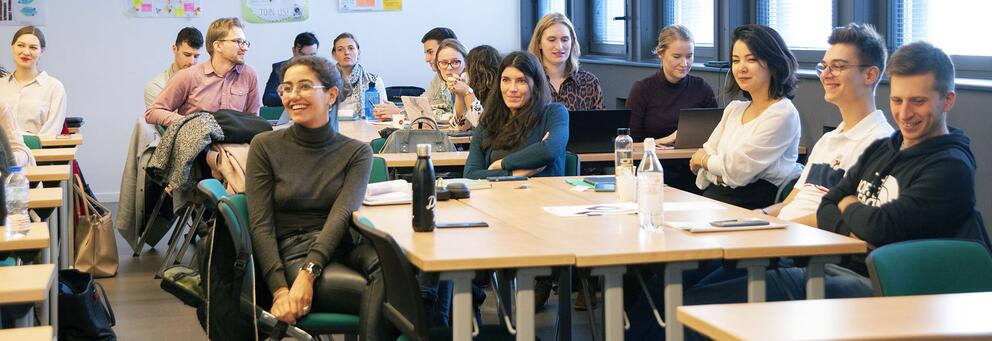
The College of Bachelor’s and Master’s Programs
The College
The role of the College of Bachelor’s and Master’s Programs is to support and promote the development of interdisciplinary and cross-cutting education within the institutions of the Sorbonne University Alliance. It also aims to foster student success, notably through remediation and support programs, peri-disciplinary enhancement modules, and more.
The strategic steering of the College of Bachelor’s and Master’s Programs, as well as the monitoring of the developed programs, is overseen by a steering committee chaired by Sorbonne University’s Vice President for Education and Student Life, Stéphanie Bonneau. This committee brings together representatives from the three faculties of Sorbonne University and from the institutions of the Sorbonne University Alliance.
The steering committee regularly reports to the Alliance Members Committee, which approves its proposals. The College Director, Benjamine Toussaint, is assisted by an administrative manager responsible for organizing and administratively monitoring the decisions made by the College, as well as coordinating enrollments and monitoring students enrolled in the College’s programs and in all inter-faculty or inter-institutional programs within the Alliance Sorbonne Université framework.
Enrollments and pedagogical follow-ups are carried out within existing training structures, by the faculties and partners of the Sorbonne University Alliance.
From Program Design to Labeling within the College
Training programs under the College may be proposed by:
- Training structures (UFRs, departments, etc.)
- Institutes and Initiatives
- Faculty members responding to SFRI project calls
- Working groups set up by the College leadership and the Assembly of Structures
- The College’s Steering Committee (COPIL)
- Faculties and member institutions of the Sorbonne University Alliance
The College leadership ensures the pedagogical coherence of these projects, their potential impact, and their alignment with the strategic plan defining the Alliance’s major priorities. The College gathers feedback from training structure directors and deans or partner institutions to confirm the feasibility and sustainability of these projects.
In cases where a project aligns perfectly with institutional objectives or represents a strategic priority for the Alliance but proves unsustainable for the involved training structures, the College will propose using PIA funding tools to support the initiative.
Finally, the College leadership presents these projects to the steering committee, which, after validation, submits them to the Sorbonne University Alliance Members Committee.
The Assembly of Structures is an integral part of the College’s governance and serves to connect all training structures within the Sorbonne University Alliance institutions. It meets in plenary session twice a year to discuss the College’s activities. These biannual meetings provide an opportunity to review past and ongoing initiatives and to engage in strategic reflection through working groups focused on specific training projects proposed by faculty, identifying emerging interdisciplinary themes, or developing cross-disciplinary modules.
- Report from February 21, 2024
- Report from June 24, 2024
écri+
To address the identified priority of helping students improve their written French skills, the College of Bachelor’s and Master’s Programs relies on the national platform écri+ for developing writing competencies and has established a tutoring program for Sorbonne University students.
In addition to providing the écri+ platform to all students within the Sorbonne University Alliance, the College has implemented tutoring services accessible to any students who may benefit from it. This tutoring is primarily aimed at first-year undergraduates (L1) but is open to all.
Seven tutors have been deployed since November across different campuses: Pierre and Marie Curie, Clignancourt, and Malesherbes. Three are based at the Pierre and Marie Curie campus and assist students from the Faculty of Science and Engineering, while four are assigned to the Faculty of Letters, split between the Malesherbes and Clignancourt campuses.
The tutors are supported on pedagogical matters by two coordinators, one from each faculty: Alexandre Gissat (Faculty of Science and Engineering) and Marc Chalier (Faculty of Arts and Humanities).
The écri+ Platform:
Free and openly accessible, the platform is an online service for assessment, development, and certification of written French skills at the university level. It is specifically designed for students with a more than adequate command of the French language and therefore is not suitable for non-francophone users.
The écri+ project was selected in the first wave of the PIA 3 "New Curricula at the University" call for projects and is supported by a consortium of sixteen French higher education and research institutions. An additional eleven “associate partner” institutions contribute to the design of tools, resources, and training systems, primarily aimed at higher education students. Including institutions that use écri+ without contributing to its development, about forty French institutions and one Canadian institution are already using the platform. Its strength lies in being created by academics to address the actual needs of university students, based on empirical observations from French higher education.
The platform allows autonomous learning across fourteen competencies organized into four domains (each with eight proficiency levels):
Word Domain:
- Choosing words and expressions
- Understanding words
- Developing a broad vocabulary
- Mastering word spelling
Sentence Domain:
- Connecting terms
- Constructing sentences
- Mastering grammatical spelling
- Mastering sentence types and modalities
Text Domain:
- Linking sentences
- Structuring texts
- Using referential expressions
Discourse Domain:
- Mastering verb tenses and moods
- Determining points of view
- Playing with stylistic effects
